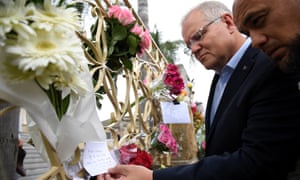The mosque attack demands a level of collective empathy that renders a divisive medevac fear campaign counterproductive
It was two nights before the massacre of 50 worshippers in a Christchurch mosque, and the focus group of swinging voters in suburban Brisbane I conducted was scratching its collective head.
Asked to identify which politicians were responsible for a series of incendiary public comments around recently passed medical evacuation (medevac) laws, they were sure they had been asked a trick question.
The propositions included the following: that the people “coming in” are paedophiles, they will clog up our hospital queues, they will end up in cultural bubbles, that western values are sacrosanct.
It was clear to the group that this was all just more divisive, racially charged rhetoric from One Nation. Except it wasn’t.Asked to identify which politicians were responsible for a series of incendiary public comments around recently passed medical evacuation (medevac) laws, they were sure they had been asked a trick question.
The propositions included the following: that the people “coming in” are paedophiles, they will clog up our hospital queues, they will end up in cultural bubbles, that western values are sacrosanct.
I was in the field because conflating medevac with border security was emerging as the Coalition’s last throw of the electoral dice. The moment the bill passed through the hung parliament into law, the prime minister had begun germinating these seeds of division.
And that was before the Christchurch mosque attack.
Make no mistake; the events of the past fortnight change the dynamics of the upcoming federal election irrevocably.
Just as the 9/11 attacks on New York were an external shock that had a profound impact on the 2001 border security narrative in validating the fears that the Howard government had been fomenting, so the Christchurch massacre demands a level of collective empathy that renders a divisive medevac fear campaign profoundly counterproductive.
Under pressure over the politicisation of race, Scott Morrison must keep the dog whistle in his pocket. Confecting fear around the plight of a group of wretched asylum seekers is no longer tenable.
Indeed, the focus has now shifted on to his willingness to recommend to Australian voters put One Nation ahead of Labor and the Greens in upcoming contests. After appropriating their rhetoric, now he needs to decide whether he is prepared to appropriate their votes as well.
In a sign of our PM’s diminished standing, this week’s Essential Report suggests if Jacinda Ardern had the inclination to change nationality, she could waltz into office in Australia with an approval rating north of 70%.
In contrast, Morrison is struggling to come to terms with his recent history, just as the nation he currently leads seeks to come to terms with theirs, as a series of questions in this week’s Essential Report clearly illustrate.
The vast majority of Australians are ready to call out white extremism as being every bit as dangerous as the Muslim fundamentalism that we have been conditioned to fear. They are also ready to back claims to hold social media platforms, the media and our politicians to account for the impact of their respective business models. While seeing the attack as an “isolated act of evil”, a significant minority seem prepared to call out racism and Islamophobia in everyday life.
Politically, all the Coalition has left in the bank now is next week’s budget when they will confect a surplus and splash around some tax cuts while decrying Labor’s attempt to dismantle tax loopholes for the well-off as proof they are high-taxing economic wreckers.
Inevitably the performance will be a tad gauche and a little desperate but, looking at the alternative, it is a debate we should all embrace with enthusiasm.
As we now know, the alternative would have been so much more dangerous.
• Peter Lewis is the executive director of Essential and a Guardian Australia columnist

No comments:
Post a Comment